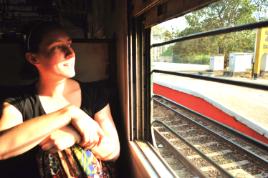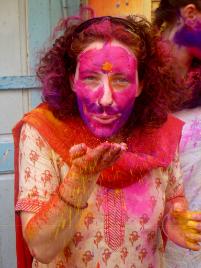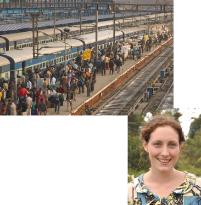'Just spent three months on a crowded train' - Lily's adventures in India
Published on 01 August, 2012
Rail researcher Lily Hirsch is not the sort of academic who stays at arm's length from her topic.
She has spent three months travelling crowded trains in Chennai and in Mumbai, where a 'super, dense crush load' is measured as high as 14-16 commuters per square metre.
In comparison, the trains Lily has studied in Australia, with her primary supervisor Dr Kirrilly Thompson, are considered crowded if they have between 4-5 commuters in a square metre.
Lily recalls that commuters she has observed on crowded trains and platforms in five major Australian cities tend to keep to themselves, bearing their ordeal individually, whereas Indian commuters are more social and bear their ordeal as a group.
"They have their regular train carriage where they play cards and sing devotional songs. There are women chatting and chopping vegetables, as well as hawkers and fish mongers and vendors selling hair clips and scarves."
Needless to say Lily has had a peculiar olfactory experience on both continents.
"Interestingly on the Indian trains it was mainly spicy food smells," she notes.
Lily is a PhD candidate based at CQUniversity's Appleton Institute in Adelaide, and is funded by the CRC for Rail Innovation.
Using a combination of ethnographic participant observation, an online survey and interviews, she's been examining train passenger tolerance levels and behaviour for reports which could help rail authorities with carriage design and etiquette campaigns.
"Our research shows crowding is related to broader customer service issues including air quality, carriage layout, handhold location and design, cleanliness and communication," Lily says.
"We expect that improving customer service in general will increase tolerance for crowding."
Interestingly, under-crowding has also been raised as an issue by respondents in relation to personal safety, especially amongst females and those travelling at night.

Lily did get to travel on some less-crowded trains. Photo by Sarah Sax
Lily was not fazed about visiting India for her intensive research, as she had been there six times before to visit family and friends. On the latest visit, she was able to live with friends in Mumbai and chose hostel accommodation in Chennai.
"While in India, I was lucky to be able to experience the Holi Festival of Colours which features throwing and smearing of coloured powder," she says.
More detail on Lily's research is available via http://www.railcrc.net.au/project/r2104

Lily got to take part in the colourful Holi Festival. Photo by Grant Mills 
Up close with Lily at the Holi Festival. Photo by Grant Mills


